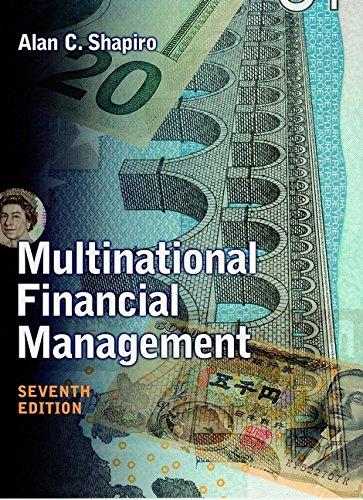Question
A small bookstore on Gran Via, one of the main arteries through Madrid and a famous shopping street, has come up with the idea of
A small bookstore on Gran Via, one of the main arteries through Madrid and a famous shopping street, has come up with the idea of delivering books to visitors to Madrid who stay in local hotels. Given the central location of the bookstore, the books would be delivered to tourists staying in nearby hotels within less than 30 minutes.
The idea for the delivery service originally came from five MBA students at Business School who conducted a market study into the potential need for such a service. From personal experience, the students knew that it is easy to forget ones current book at home while travelling. The five MBA students spent last summer interviewing local tourists about the desirability of such a service. Manuel Muoz, the bookstore owner, sponsored this market study with 1,250. The market study also revealed that Amazon were planning to set up a similar delivery service in central Madrid. Due to various administrative delays, Amazon would only be able to start its delivery service in exactly 3 years from now. It would then immediately price Manuels bookstore out of the market.
The bookstore would need to buy two electric bicycles for the delivery people at a price of 1,500 each. The two bicycles would be fully depreciated in a straight line over the three years. They could be sold for 400 each at the end of the project. The bookstore would also need to use an empty room at the back of the store as a storeroom. If the bookstore were not to go ahead with the delivery service, the empty room could be rented out at a monthly rent of 2,000. The storage room would require heavy-duty metal shelves at a total cost of 4,000.
If going ahead, Manuel wants to advertise the new delivery service by distributing leaflets to nearby hotels. He has been quoted a fee of 15,000 for the design of various promotional items and another 3,200 for the printing of sufficient leaflets and other promotional items (such as free cupholders) to last for the next three years.
The two delivery people needed for the delivery service would be paid 16,000 p.a. However, Manuel expects to relocate an existing employee who already works for the bookstore to the delivery service. This employee currently earns 15,000 p.a.
The new delivery service would generate sales of 750 books, 1,000 books and 1,200 books each month during the first year, the second year and the third year, respectively. The average sales price of the books would be 20. The cost of the books sold is 75% of their sales price to the customers. Manuel expects that the number of books sold instore would drop by 25% of the number of books sold via the delivery service. The average sales price per book for the eroded sales is 15 and the cost of the books sold is 80%. The bookstore pays 30% of tax on its profits.
Manuel is somewhat confused about his cost of capital. He knows that he should not rely on the bookstores historic cost of debt. He therefore phoned up his bank manager who quoted him an interest rate of 7% if he were to take out a loan today. Following some extensive research on the internet, he is pretty sure that the equity beta of his bookstore is roughly 1.3. He asked one of his regular customers, a finance professor at IE, what risk premium he should use for the market premium. The professor suggested to use a market risk premium of 5.8% p.a.
However, Manuel does not know what rate to use for the risk-free rate. He looked up the yields on various debt securities issued by the Spanish government and he found the following:
| Debt security | Current yield |
| 3-month bills | 1.820% |
| 1-year bills | 2.655% |
| 3-year bonos | 2.746% |
| 5-year bonos | 2.952% |
| 10-year bonos | 3.384% |
| Note: The Spanish word for bond is bono". |
The bookstore is currently financed by 35% of debt and 65% of equity. The new project is expected to require the same capital structure or mix of debt and equity as the entire bookstore.
Net working capital of 12% of the annual sales revenue would need to be in place at the start of each year. The net working capital would be fully recovered at the end of the project.
Manuel does not feel very confident about estimating his cost of capital. Would you be able to help him? What value would you suggest for the cost of capital? Please answer each of the following questions:
- Manuel does not feel very confident about his estimated cost of capital. Would you be able to reassure him? If yes, how?
Would you be able to help him? What would be your suggested cost of capital? Write your recommendation (paragraph
Step by Step Solution
There are 3 Steps involved in it
Step: 1

Get Instant Access to Expert-Tailored Solutions
See step-by-step solutions with expert insights and AI powered tools for academic success
Step: 2

Step: 3

Ace Your Homework with AI
Get the answers you need in no time with our AI-driven, step-by-step assistance
Get Started


